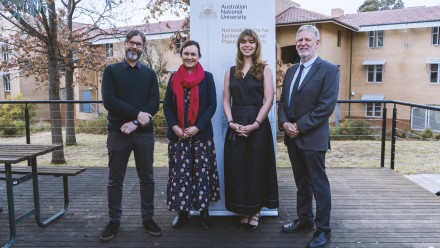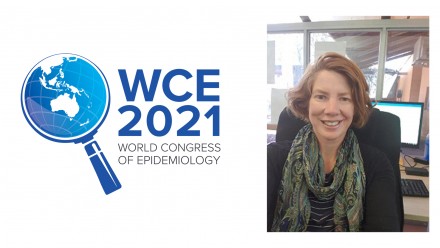2020 Baume Travel Grant – Alyson Wright’s learnings from the World Congress of Epidemiology 2021
I used the Peter Baume sponsorship to attend and present at the online World Congress of Epidemiology from 3-6 September 2021.
My conference registration included participating in a preconference short course. I attended the Causal Mediation Analysis by Professor Tyler VanderWeele, Harvard University. I really enjoyed the course content, particularly because I have used the mediation analysis method in a previous analysis looking at relationship between Indigenous Ranger employment and wellbeing. One of the take home messages from the workshop was the importance of considering confounders on mediator-outcome. In addition, Professor Vanderweele also spent some time explaining E-value, as a way to test sensitivity in an analysis. The E-value (VanderWeele and Ding, 2017) is: “the minimum strength of association on the risk ratio scale that an unmeasured confounder would need to have with both the treatment and the outcome, conditional on the measured covariates, to fully explain away a specific treatment-outcome association.”
I attended almost all of the keynote addresses over the conference period. Particular stand-outs for me in these sessions were:
- Dr Abigail Echo-Hawkes, Urban Indian Health Institute, keynote on the first morning “Decolonise data: Equity in Practice”, where she described lack of data is inhibiting First Nation peoples’ ability to do good science and to truly serve their communities. She used an example of analysis on COVID-19 by US States, which demonstrates that some states do not collect appropriate identification data, an issue not uncommon to Indigenous health in Australia.
- Prof Reddy, Public Health Foundation of India, Evolution of Epidemiology: Methods Must Match Mission, where he highlighted the continual importance of the epidemiological discipline as “a science with a social mission”. He also talked of the value of social science, labelling epidemiology and social science as ‘Gemini twins’.
There was diverse range of topics within the conference sessions, and I admit it was often hard to pick which one to attend. Highlights for me in the sessions were:
Day 1: Living with COVID-19? Implications for industry, policymakers and academia sponsored by University of Melbourne. I particularly appreciated Tony Blakely line here “Reducing R0 will be as much about society as it about the virus”. The session had a Political Scientist on the panel and I thought he gave some provocative statements at the end of the need to balance public health responses with considerations of cultural/social needs, and human rights.
Day 2: I presented alongside some great researchers (including Dr Kalinda Griffiths, Ass Prof Judith Katzenellenbogen, Ms Leah Cave) in the session Epidemiology and Indigenous Populations. We got to see a range of work from Indigenous health in Australia, and it was great that the session included a presentation from a Yvette Paullino from University Gaum on a feasibility study investigation gout and metabolic conditions among Chamoru men.
Day 3: Countdown to 2030: The session had a lot of presentations focussed on inequalities and women’s empowerment, including a number of analysis looking at female-headed houses (the definitions of which are interesting even before the data findings are revealed).
I want to thank NCEPH and the donor for the opportunity to participate in the conference. I learnt a lot from the experience and whilst, the virtual platform has some challenges in participation, it was overall a satisfying and enriching event.








